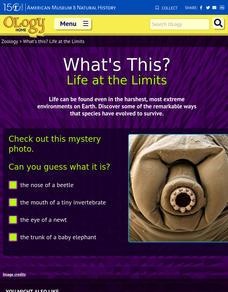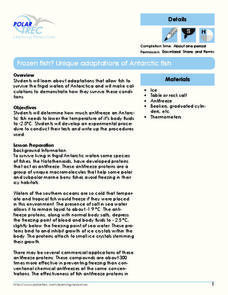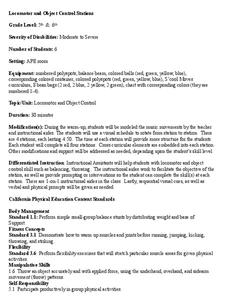Curated OER
Prairie Scales and Prairie Smoothies
Sixth graders explore the animals that live on the prairie and identify differences between amphibians and reptiles and the adaptations each have made to live on the prairie.
Curated OER
Mice Rule!
Students explain what biodiversity is and how adaptive features are maintained in a population. In this biodiversity lesson students complete a simple activity involving mouse populations.
Curated OER
Stella the Swan
Learners study the similarities and differences between ducks, geese, and swans. They tell the story about how water fowl adapt to life in water using props.
Curated OER
Natural Selection
Biology learners tackle evolution-related concepts when viewing this collection of slides. There are no graphics or photos, just notes in bullet-point style detailing adaptations, evidence for evolution, mechanisms for change, and types...
Perkins School for the Blind
Tug of War
Don't be fooled by how short this instructional activity is; it contains a good idea for adaptive PE. The activity is intended to help learners with visual impairments increase motor skills, muscle strength, and mobility. Two kids play a...
Curated OER
All in a Day's Work
Who is Herman Melville? Read and discuss "Bartleby the Scrivener: A Story of Wall-street." Then, discuss the film adaptations of Melville's work and translate a passage of the text into modern-day English. Discussion questions are...
ARKive
Adaptations for Movement
What animals are best suited for moving around a rainforest, or a desert? Design your own animal species based on a particular habitat, focusing on the characteristics it will need for optimal movement. Great as a group lesson or...
American Museum of Natural History
What's This? Staying Safe
Amaze the class with the creative adaptations species employ to trick predators. An online interactive lesson introduces learners to six different species with unique adaptations. Each species highlights a different adaptation and its...
American Museum of Natural History
What's This? Life at the Limits
There are some amazing ways species evolve to survive. From large ears to sneezing salt, learners read about these interesting adaptations in an interactive lesson. Great to supplement an in-class lesson, it also works well as a remote...
National Wildlife Federation
Life in the Cold: Climate Challenges
What does it take to make it in the Arctic? Learners examine the cold weather adaptations of a polar bear that help it survive. With everyday objects, they model these characteristics as they become make-shift polar bears. Modeling helps...
Perkins School for the Blind
Beanbag Toss
Why is learning how to catch and toss so important? If one has visual impairments, learning this basic skill will help him increase orientation and mobility, coordination, and cognitive development,. Mastery of this skill will also mean...
Perkins School for the Blind
Modified T-Ball
Baseball can be so entertaining! Here are a few great ideas you can use to get your learners with visual impairments out on the old ball field. A sound-enhanced pitching device or T-ball stand is used to alert players when it's time to...
Polar Trec
Frozen Fish? Unique Adaptations of Antarctic Fish
Some fish contain proteins that act like antifreeze in order for them to live in the frigid waters of Antarctica! High schoolers determine how much antifreeze a fish needs to lower its body temp to -2.5 degrees. Teachers act as a...
Howard Hughes Medical Institute
Sorting Finch Species
Don't just tell your class about Darwin's finches ... show them! Sort some of science's most famous birds using an interactive lesson. Learners try their hand at classifying finches using song, sonogram, and beak appearance, as well as...
Cornell Lab of Ornithology
Jump, Glide, or Fly? Exploring Bird Evolution
How have birds evolved from prehistoric animals? With the three-part lesson, small groups first research different prehistoric animals and determine whether they are birds. Then, scholars explore different bird adaptations using the Flap...
Umaine Museum of Art
Bony Fish Anatomy Worksheet
Take time to appreciate the beauty in the anatomy of animals with this cross-curricular art and science activity. After viewing examples of fish-themed artwork, children complete the included worksheet by labeling the...
Teaching Adapted PE
Locomotor and Object Control Stations
Develop children's basic locomotor and object control skills with an invigorating Adaptive PE lesson. A series of four, timed stations engaged the class in playing a game of Twister, walking on a balance beam,...
American Museum of Natural History
What's This? Reproduction
Attracting the right mate is as important for humans as any other species. An interesting lesson teaches individuals about several strategies that animals and plants have adapted to attract their mates. From colorful nests to powerful...
National Museum of the American Indian
The A:Shiwi (Zuni) People: A Study in Environment, Adaptation, and Agricultural Practices
Discover the connection of native peoples to their natural world, including cultural and agricultural practices, by studying the Zuni people of the American Southwest. This lesson includes examining a poster's photographs, reading...
Curated OER
Animal Adaptations
Fourth graders research how animals adapt to their environment. For this animal adaptation lesson, 4th graders discover the reasons behind animal adaptations. Students create a project using Kidspiration software.
Curated OER
Animal Adaptations
In this animal adaptations worksheet, students will complete a graphic organizer by brainstorming 3 animals and an adaptation that animal has that helps it to survive.
Curated OER
Animal Adaptations
In this animal adaptations worksheet, students will write down three different parts of an animal that help that animal to live. This worksheet is a graphic organizer with 3 short answer questions.
Curated OER
Adaptations for Survival--The Spittlebug
In this adaptations for survival worksheet, students list 2 reasons why the foam secreted from spittle bugs help the insect survive. Students view 2 pictures of spittle bugs and determine which one is more visible to passing birds...
Wild Screen
Evolution and Adaptation
The lesson plan on adaptation and evolution included here is a bit difficult to navigate using the teacher notes, but if you start with the handout, there are directions to guide you through the lesson plan. The link to the scrapbook...
Other popular searches
- Animal Adaptations
- Ocean Animal Adaptations
- Bird Beak Adaptation
- Plant Adaptations
- Behavioral Adaptations
- Adaptation and Evolution
- Bird Adaptations
- Insect Adaptations
- Plant and Animal Adaptation
- Fantasy Animal Adaptations
- Fish Adaptations
- Adaptation Habitat























